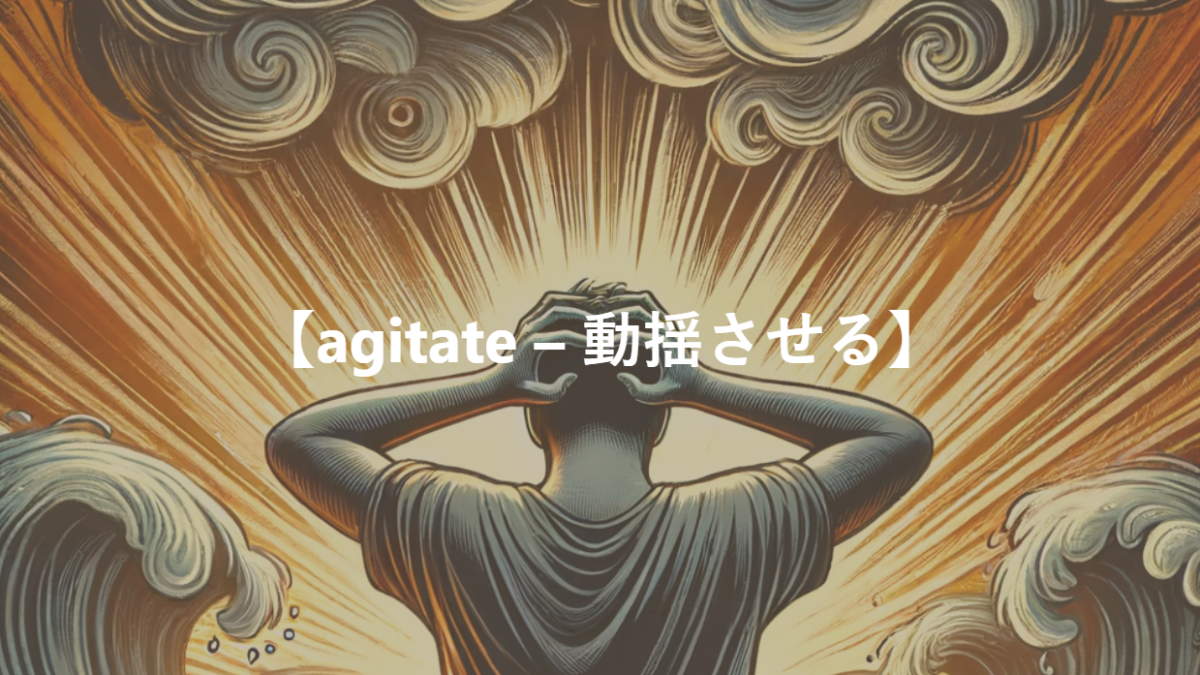語源・類義語・反対語・例文
【Agitate – 動揺させる】という単語の語源とか由来を知っていますか?
“Agitate”という単語は、ラテン語の”agitare”から来ており、これは”agere”(行動する、駆り立てる)から派生したものです。”agitare”には「繰り返し動かす」「激しく動かす」という意味があります。この語源は、”agitate”が現代英語で「動揺させる」「騒がせる」などの意味を持つようになった背景を説明しています。つまり、何かを繰り返し、または激しく動かすことから、感情や思考を激しく揺さぶり、人々を行動に駆り立てることへと意味が拡がったのです。19世紀には、特に政治的な文脈で「騒ぎを起こす」「活動を促す」という意味で使われるようになりました。
The word “agitate” originates from the Latin “agitare,” which is derived from “agere,” meaning “to act” or “to drive.” “Agitare” carries the meanings of “to move repeatedly” or “to move violently.” This etymology explains how “agitate” came to have meanings like “to disturb” or “to stir up” in modern English. Essentially, the action of moving something repeatedly or violently expanded to include the idea of vigorously shaking emotions or thoughts, motivating people to act. By the 19th century, it especially gained usage in a political context to mean “to stir up trouble” or “to encourage activity.”
この単語の類義語・反対語を教えてください。
類義語
- Stir up: 刺激する、騒ぎを起こす
- Provoke: 挑発する、引き起こす
- Disturb: 邪魔する、乱す
- Rouse: 目覚めさせる、奮起させる
- Excite: 興奮させる、刺激する
- Incite: 扇動する、煽る
反寧語
- Calm: 静める、落ち着かせる
- Soothe: 和らげる、なだめる
- Settle: 落ち着かせる、解決する
- Pacify: 平和にする、なだめる
- Quell: 鎮める、抑える
- Stabilize: 安定させる、固定する
この単語を使った例文を5つほど教えてください。
The controversial speech agitated the crowd and sparked intense debates.
(その物議を醸すスピーチは群衆を動揺させ、激しい議論を引き起こしました。)
The news of the impending layoffs agitated the employees and caused anxiety in the workplace.
(迫り来る解雇のニュースは従業員を動揺させ、職場で不安を引き起こしました。)
The activists agitated for equal rights and social justice through peaceful protests.
(活動家たちは平和的な抗議を通じて平等な権利と社会的正義を求めました。)
The loud noise from construction work agitated the residents living nearby.
(工事の騒音が近くに住む住民を動揺させました。)
The provocative article agitated readers and sparked a heated discussion online.
(挑発的な記事は読者を動揺させ、オンラインで激しい議論を引き起こしました。)
【agitate – 動揺させる】のコロケーション
- Agitate for change – 変化を求めて動揺させる
- 社会的、政治的な変化や改革を求めて活動する状況を表します。人々が現状に不満を持ち、改善や変更を求めて声を上げることを意味します。
- Agitate the public – 一般大衆を動揺させる
- 情報や出来事が一般の人々の間で不安や懸念を引き起こす状況を指します。特定のニュースや出来事が社会に広がり、人々の感情を揺さぶることを表します。
- Agitate against something – 何かに対して動揺させる
- ある政策、法律、または社会的慣習など、特定の事柄に反対して活動することを意味します。不満や反対の意見を持つ人々が集まり、変更を促すために行動を起こす状況です。
“Agitate”という単語は、その力強い意味と用途によって、人々の感情や行動に大きな影響を与えることができます。
まず、”Agitate for change”という表現は、変化や改革を求めて声を上げる人々の情熱と活動を表します。このフレーズは、社会的または政治的な文脈でよく使われ、現状に対する不満から新たな方向への移行を求める動きを示します。
次に、”Agitate the public”についてです。このフレーズは、あるニュースや出来事が一般の人々の間で不安や懸念を引き起こし、広範な反応を呼び起こす状況を描写します。この表現は、社会全体が何らかの問題に対して意識を高め、反応を示す様子を捉えています。
そして、”Agitate against something”は、特定の政策、法律、または社会的慣習に対して行われる反対運動を指します。これは、集団が集まり、共通の目標に向かって行動する様子を表現しており、変化を促すための力強い動きを象徴しています。
The word “agitate” can have a significant impact on people’s emotions and actions due to its powerful meaning and applications.
First, the expression “Agitate for change” represents the passion and activities of people who raise their voices seeking change or reform. This phrase is commonly used in social or political contexts, indicating movements that arise from dissatisfaction with the current state and seek a transition to a new direction.
Next is “Agitate the public.” This phrase describes situations where certain news or events cause anxiety or concern among the general populace, eliciting a broad response. It captures how society as a whole becomes more aware of and reacts to a particular issue.
Lastly, “Agitate against something” refers to opposition movements against specific policies, laws, or social customs. It depicts the gathering of groups to act towards a common goal, symbolizing a powerful movement to prompt change.
agitateを使った文法問題5選
- 品詞問題: 次の文中のagitateの品詞はどれですか?
The news of the scandal agitated the public.
- (a) 名詞
- (b) 動詞
- (c) 形容詞
- (d) 副詞
解答: (b) 動詞
解説: agitateは「動揺させる」「扇動する」という意味の動詞です。この文では、スキャンダルのニュースが世間を動揺させた、という意味で使われています。
- 類義語問題: 次の単語の中でagitateの類義語として最も適切なものはどれですか?
- (a) upset
- (b) disturb
- (c) stir up
- (d) provoke
解答: (a) upset, (b) disturb, (c) stir up, (d) provoke
解説: これらの単語はすべて「動揺させる」「かき乱す」というニュアンスを含んでおり、agitateの類義語として適切です。
- 語法問題: 次の文の( )に入る適切な前置詞はどれですか?
The protesters agitated ( ) changes in the government’s policies.
- (a) for
- (b) against
- (c) to
- (d) with
解答: (a) for
解説: agitate for ~で「~を求めて扇動する」という意味になります。
- 文脈理解問題: 次の文脈においてagitateが意味するものはどれですか?
The washing machine agitates the clothes to remove dirt and stains.
- (a) 加熱する
- (b) すすぐ
- (c) かき回す
- (d) 脱水する
解答: (c) かき回す
解説: この文脈では、agitateは洗濯機が汚れを落とすために服を「かき回す」という意味で使われています。
- 空欄補充問題: 次の文の( )に入る適切な単語はどれですか?
The politician’s speech was intended to ( ) the crowd and incite them to action.
- (a) agitate
- (b) agitated
- (c) agitating
- (d) agitation
解答: (a) agitate
解説: be intended to doで「~することを意図する」という意味になります。したがって、原形のagitateが入ります。

